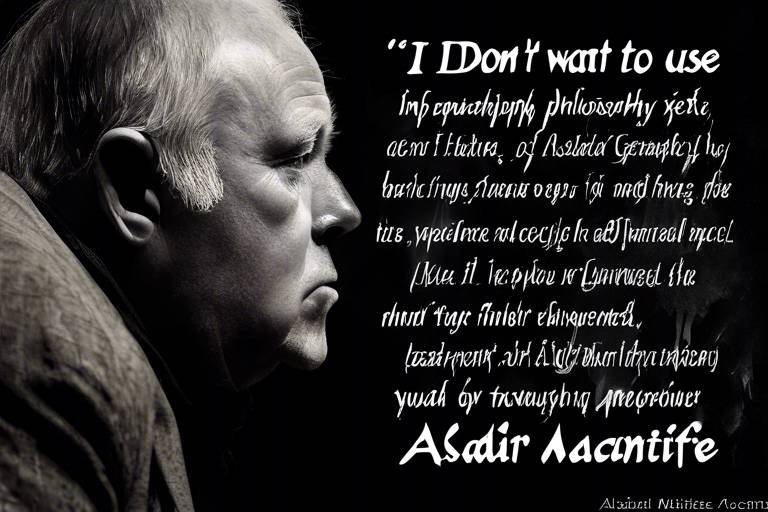The Philosophical Insights of Ayn Rand - Objectivism
In a world where philosophies often clash and ideologies compete for dominance, Ayn Rand's Objectivism stands out as a beacon of individualism and rational thought. This article delves deep into the core principles of Objectivism, exploring how they shape our understanding of ethics, capitalism, and individual rights. But what exactly is Objectivism, and why should it matter to you? Let’s embark on this intellectual journey together, peeling back the layers of Rand's philosophy to reveal its implications for our lives today.
At its heart, Objectivism is a philosophical system that champions the power of reason, the sanctity of individualism, and the pursuit of happiness as one's ultimate goal. Imagine a world where your happiness is not just a fleeting emotion but a valid and achievable objective. Rand's philosophy asserts that each person is an end in themselves, and this idea reshapes how we view our relationships with others and society at large. The foundational concepts of Objectivism can be summarized as follows:
- Reality exists independent of consciousness. This means that the world is not a product of our thoughts or feelings; it exists objectively.
- Reason is the only means of acquiring knowledge. Emotions and faith are not reliable guides to understanding the world.
- Individuals have the right to pursue their own happiness. This pursuit is not selfish in a negative sense, but a moral imperative.
These principles form the bedrock of Rand's worldview, encouraging us to embrace our rational faculties and take charge of our destinies.
In Rand's philosophy, reason is not just a tool; it is the very essence of what it means to be human. Think about it: without reason, we would be adrift in a sea of chaos, subject to whims and irrational beliefs. Rand argues that rationality is essential for human survival and flourishing. Unlike faith-based or emotion-driven philosophies that often lead to conflict and confusion, Objectivism posits that our ability to think critically and logically is what enables us to navigate life effectively.
Rand’s emphasis on reason challenges us to question the status quo and reject dogmas that don't stand up to logical scrutiny. In a world filled with misinformation and emotional appeals, the call to embrace reason is both a radical and necessary stance. It invites us to engage with reality on its own terms, making informed decisions that align with our values and goals.
One of the most striking aspects of Objectivism is its unwavering commitment to individual rights. Rand fiercely critiques collectivism, which she views as a threat to personal freedom and responsibility. In her view, collectivism undermines the individual by prioritizing the group over the person, leading to a society where mediocrity is celebrated and excellence is stifled. But why is individualism so crucial?
Individualism fosters an environment where personal responsibility reigns supreme. It encourages people to take ownership of their lives and decisions, leading to a more vibrant and innovative society. Rand believed that when individuals are free to pursue their own interests, they contribute to the greater good in ways that collectivist systems cannot replicate. Think of it as a garden: when each flower blooms in its own unique way, the garden as a whole flourishes.
Now, let’s talk about a concept that often raises eyebrows: self-interest. Rand argues that pursuing one's own self-interest is not only moral but essential for a fulfilling life. This doesn't mean trampling over others to get what you want; rather, it’s about recognizing that your happiness is intertwined with the happiness of those around you. By focusing on your own goals and aspirations, you inadvertently contribute to a more productive and harmonious society.
Self-interest, in Rand's view, is the driving force behind human progress. When individuals are motivated to achieve their own goals, they innovate, create, and inspire others. This ethical framework shifts the narrative from one of sacrifice and altruism to one of empowerment and achievement. It’s a refreshing perspective that encourages us to view our ambitions as not just personal pursuits but as contributions to the collective tapestry of society.
According to Rand, capitalism is the only moral social system because it respects individual rights and promotes freedom. In a capitalist society, individuals are free to trade and interact with one another without coercion, enabling a dynamic marketplace of ideas and goods. Rand argues that this freedom is essential for human progress, as it allows creativity and innovation to thrive.
Moreover, capitalism is not just an economic system; it’s a reflection of the moral principles that underpin Objectivism. It aligns with the idea that individuals should be free to pursue their own happiness, and it provides the framework within which they can do so. In this sense, capitalism is not merely about profit; it’s about the freedom to choose how to live your life.
Rand believed that art plays a crucial role in human life, serving as a means of expressing and communicating philosophical ideas and values. Art, in her view, is not just a form of entertainment; it is a reflection of a creator's values and a way to explore the human experience. Through art, we can convey complex ideas and emotions that resonate on a profound level.
For Rand, the best art embodies the ideals of Objectivism, celebrating the individual and the heroism of human achievement. It challenges us to reflect on our own values and aspirations, pushing us to strive for greatness in our own lives.
Despite its influence, Objectivism has faced criticism from various quarters. Detractors argue that Rand's philosophy can be overly simplistic, dismissing the complexities of human relationships and societal structures. Some view her emphasis on self-interest as promoting selfishness at the expense of community and cooperation. However, proponents of Objectivism contend that Rand's ideas are often misunderstood and that a deeper examination reveals a robust framework for understanding human behavior and ethics.
So, where does Objectivism fit into our contemporary landscape? In an age marked by debates over individual rights, government intervention, and personal freedom, Rand's principles resonate more than ever. The call for personal responsibility and the right to pursue one's own happiness serves as a counterpoint to collectivist tendencies that seek to impose restrictions on individual choice.
As we navigate the complexities of modern life, Rand's philosophy encourages us to embrace our individuality and challenge the status quo. Whether it's in politics, economics, or personal relationships, the ideas of Objectivism continue to spark discussions and inspire those who seek to understand the world through a lens of reason and personal empowerment.
Ayn Rand's ideas have left an indelible mark on philosophy, politics, and culture. Her advocacy for reason, individualism, and capitalism invites us to reconsider our values and the structures that govern our lives. As we reflect on her legacy, it becomes clear that her insights remain relevant in today's world, challenging us to think critically about our choices and the society we wish to create.
What is Objectivism?
Objectivism is a philosophical system developed by Ayn Rand that emphasizes reason, individualism, and the pursuit of one's own happiness.
Why is reason important in Objectivism?
Reason is considered the primary means of knowledge and is essential for human survival and flourishing in Objectivism.
How does Objectivism view capitalism?
Objectivism posits that capitalism is the only moral social system, as it respects individual rights and promotes freedom.
What are some criticisms of Objectivism?
Critics argue that Objectivism can be overly simplistic and that its emphasis on self-interest may promote selfishness at the expense of community.

Understanding Objectivism
Objectivism is not just a philosophy; it’s a comprehensive system of thought that champions the power of the individual. Developed by Ayn Rand, this philosophy is anchored in the belief that reality exists independent of consciousness, and that individuals can gain knowledge through reason. Imagine standing on a cliff, overlooking a vast landscape; the clear view before you represents the objective reality that Rand argues we must recognize and engage with. This perspective is a radical departure from many philosophical traditions that emphasize subjective experiences or collective norms.
At its core, Objectivism promotes the idea that the pursuit of one’s own happiness is the highest moral purpose of life. This is not a selfish, hedonistic pursuit, but rather a call to embrace rational self-interest. What does this mean? It means that by striving for your own goals and values, you contribute to the overall well-being of society. Think of it as the ripple effect: when individuals thrive, their success can inspire and uplift those around them.
To further understand Objectivism, it’s essential to break down its foundational concepts:
- Reality: Objectivism asserts that reality is objective and can be understood through observation and reason.
- Reason: The primary means of acquiring knowledge, contrasting sharply with faith or emotions.
- Individualism: Emphasizes the moral worth of the individual over the collective.
- Capitalism: The only moral social system, as it respects individual rights and freedom.
These principles are not merely abstract ideas; they form the bedrock of a worldview that encourages personal responsibility and accountability. Rand believed that an individual should not sacrifice their values or happiness for the sake of others, nor should they expect others to sacrifice for them. This radical individualism challenges the conventional wisdom that often prioritizes the group over the individual, urging us to reconsider the balance between personal freedom and societal expectations.
Moreover, Objectivism extends beyond personal ethics to encompass a broader social and political philosophy. It advocates for a system where individuals are free to pursue their own paths, unencumbered by excessive government intervention or societal pressures. Think of it as a garden where each plant grows to its fullest potential, rather than being pruned to fit a predetermined shape. In this garden, diversity flourishes, and the beauty of each unique flower contributes to the overall landscape.
In summary, understanding Objectivism requires embracing its core tenets: the significance of reason, the moral imperative of individualism, and the belief in a free market as the best means of achieving human progress. As we delve deeper into the implications of Rand's philosophy, it becomes clear that Objectivism is not just a set of ideas but a call to action for those who seek to live authentically and fully.

The Role of Reason
In the realm of Objectivism, reason stands as the unwavering beacon guiding human thought and action. For Ayn Rand, reason is not merely a tool; it is the very essence of what it means to be human. Imagine a ship navigating through a stormy sea—without a compass, the ship is at the mercy of the waves. Similarly, without reason, individuals can easily drift into the chaos of irrationality and emotionalism. Rand asserts that the ability to reason is what separates humans from other beings, enabling us to understand the world and make informed choices that lead to our own happiness.
Rand passionately argues that reason is the primary means of acquiring knowledge. This perspective is a radical departure from philosophies that prioritize faith or emotions as pathways to understanding reality. She contends that relying on anything other than reason is not only dangerous but also detrimental to our survival and flourishing. In her view, the mind is our most powerful asset, and to neglect it is to invite a life of mediocrity or worse.
To illustrate this point, consider the following principles that underpin Rand's philosophy regarding reason:
- Objective Reality: Rand posits that reality exists independent of consciousness. This means that facts are facts, regardless of personal beliefs or feelings.
- Rational Self-Interest: Individuals should act in accordance with their rational self-interest, making choices that will lead to their own well-being.
- Critical Thinking: The ability to think critically and evaluate evidence is essential for making sound decisions.
Rand's emphasis on reason also extends to the idea of rationality as a virtue. She believed that rationality is not just about thinking logically; it is about being committed to using one’s mind to understand the world. This commitment requires an individual to be disciplined and to actively seek knowledge, rather than passively accepting ideas handed down by others. In a society where emotional appeals often overshadow rational discourse, Rand's advocacy for reason challenges us to return to a more logical and evidence-based approach to understanding our lives and the world around us.
Moreover, Rand's philosophy invites us to consider the implications of abandoning reason. When individuals allow emotions or societal pressures to dictate their beliefs, they risk losing their autonomy and the ability to think for themselves. This is particularly relevant in today's fast-paced world, where misinformation can spread like wildfire, often leading to misguided beliefs and actions. Rand's call to embrace reason serves as a reminder that we must remain vigilant and discerning, ensuring that our decisions are grounded in rational thought rather than fleeting emotions or popular opinions.
In summary, the role of reason in Objectivism is not just a theoretical framework; it is a practical guide for living a fulfilling and productive life. By championing reason as the cornerstone of human existence, Ayn Rand encourages us to take charge of our thoughts, make informed choices, and pursue our own happiness with confidence and clarity. In a world fraught with uncertainties, the ability to think rationally is not just advantageous—it is essential for navigating the complexities of life.

Individualism vs. Collectivism
Ayn Rand's philosophy of Objectivism stands as a strong beacon for individualism, sharply contrasting with the often prevailing notion of collectivism. At its core, individualism celebrates the unique potential and rights of each person, asserting that every individual is an end in themselves. This perspective fundamentally challenges the idea that the group or society should take precedence over the individual. Rand argues that when individuals are free to pursue their own goals and desires, they contribute to society in ways that are both meaningful and productive.
In a collectivist society, the individual often becomes merely a cog in the machine, expected to conform to the will of the group. This can lead to a range of issues, from the suppression of personal freedoms to a lack of innovation and creativity. Rand vehemently critiques this mindset, suggesting that it stifles human potential and undermines the very essence of what it means to be human. She posits that true progress arises not from the collective, but from the achievements and aspirations of individuals who are empowered to think and act independently.
To illustrate the distinction between these two philosophies, consider the following table:
| Aspect | Individualism | Collectivism |
|---|---|---|
| Focus | Individual rights and freedoms | Group needs and goals |
| Ethics | Self-interest is moral | Self-sacrifice for the group is virtuous |
| Societal Role | Innovation through personal initiative | Conformity and uniformity |
| Economic System | Capitalism | Socialism or Communism |
Rand's emphasis on personal responsibility is another critical element in her critique of collectivism. She believed that individuals should be held accountable for their actions, and that this accountability is essential for a just society. When people are encouraged to take ownership of their choices, they are more likely to strive for excellence and contribute positively to society. On the other hand, collectivism often promotes a sense of entitlement, where individuals may feel less inclined to take responsibility for their actions, believing instead that the group will bear the burden of their failures.
Moreover, Rand’s vision of a society rooted in individualism fosters an environment where innovation and creativity can flourish. When individuals are free to explore their passions and interests without the constraints of collectivist ideologies, they can push boundaries and challenge the status quo. This not only benefits the individual but also propels society forward, leading to advancements in technology, art, and culture.
In conclusion, the clash between individualism and collectivism is not merely a philosophical debate; it is a profound examination of what it means to live a fulfilling life. Rand's advocacy for individual rights and her critique of collectivism serve as a reminder that the strength of society lies in the empowerment of its individuals. As we navigate the complexities of modern life, her insights encourage us to embrace our uniqueness and champion the freedom to pursue our own happiness.
- What is the main difference between individualism and collectivism? Individualism emphasizes the rights and freedoms of the individual, while collectivism prioritizes the needs and goals of the group.
- How does Ayn Rand view self-interest? Rand argues that pursuing one's own self-interest is moral and leads to a more productive and fulfilling life.
- Why is personal responsibility important in Objectivism? Personal responsibility is crucial because it empowers individuals to make choices and be accountable for their actions, fostering a just society.
- What role does innovation play in individualism? Individualism encourages innovation by allowing people the freedom to explore their passions and challenge existing norms.

The Ethics of Self-Interest
Ayn Rand's philosophy of Objectivism boldly asserts that pursuing one's own self-interest is not just acceptable; it's moral. This radical idea flips the conventional notion of altruism on its head, challenging us to reconsider what it means to act ethically in our daily lives. Imagine a world where your happiness and success are not just secondary considerations but are, in fact, the primary goals. Rand argues that when individuals prioritize their own well-being, they not only thrive but also contribute to the greater good of society.
At the core of Rand's ethical framework is the belief that self-interest leads to productive and fulfilling lives. When individuals are free to chase their passions and ambitions, they innovate, create, and uplift those around them. This is not a call for selfishness in the traditional sense—where one harms others for personal gain—but rather an invitation to understand that your achievements can benefit others. For example, consider an entrepreneur who develops a groundbreaking technology. Their drive for success not only fulfills their aspirations but also creates jobs, enhances lives, and pushes society forward.
Rand's view of self-interest can be summarized in several key principles:
- Rational Self-Interest: Acting in a way that is consistent with one's values and goals, using reason as a guide.
- Productive Achievement: Valuing work and creativity as essential components of a meaningful life.
- Mutual Benefit: Recognizing that voluntary trade and cooperation can lead to win-win situations.
Critics often misinterpret Rand's advocacy for self-interest as a license for greed or exploitation. However, this is a misunderstanding of her philosophy. Rand emphasizes that self-interest must be pursued through rational means, respecting the rights of others. Thus, ethical self-interest is not a zero-sum game; it thrives on the principle of voluntary exchange. When two parties engage in a transaction, both leave better off than before, demonstrating how self-interest can lead to collective progress.
Moreover, Rand argues that self-sacrifice, often glorified in many cultures, can lead to a cycle of dependency and resentment. By advocating for self-interest, she encourages individuals to take responsibility for their own lives, fostering a sense of empowerment and self-worth. In her view, the ultimate moral purpose of life is the pursuit of one's happiness, and that pursuit is best achieved by respecting one's own needs and desires.
In essence, Rand's ethics of self-interest challenge us to embrace our individuality and recognize that our personal happiness is not just a personal affair; it is intertwined with the prosperity of society as a whole. When we act in our own best interests, we create a ripple effect that can lead to broader societal benefits. So, the next time you question whether it's right to put yourself first, remember that in Rand's world, doing so is not just ethical—it's essential for a thriving society.
- What is the main idea behind Rand's ethics of self-interest?
Rand believes that pursuing one's own self-interest is moral and leads to productive, fulfilling lives. - How does self-interest benefit society?
When individuals pursue their passions, they innovate and create, which ultimately benefits society as a whole. - Is self-interest the same as selfishness?
No, Rand distinguishes between rational self-interest and selfishness; the former respects the rights of others and promotes mutual benefit.

Capitalism and Freedom
When we think about capitalism, we often picture bustling markets, innovative startups, and the freedom to choose our paths. Ayn Rand, the architect of Objectivism, viewed capitalism as not just an economic system but as a moral imperative. According to her, capitalism is the only system that recognizes individual rights and allows people to pursue their own happiness without interference. In her view, freedom and capitalism are intertwined, like two dancers moving in perfect harmony.
Rand argued that capitalism is a system based on voluntary exchange. This means that individuals engage in trade and commerce out of their own free will, rather than through coercion or force. Imagine a marketplace where every transaction is a win-win situation, where both parties leave with something they value. This is the essence of capitalism according to Rand. It promotes personal responsibility and encourages individuals to act in their own self-interest, which paradoxically leads to the betterment of society as a whole.
One of the most compelling aspects of Rand's philosophy is her belief that true freedom cannot exist without economic freedom. She posited that when government intervenes in the market, it inevitably infringes on individual rights. This is where the debate gets heated. Critics often argue that some level of regulation is necessary to prevent exploitation and ensure fairness. However, Rand would counter that such interventions stifle innovation and create dependency, ultimately leading to a loss of freedom.
To illustrate this point, consider the following table that outlines the contrast between capitalism and collectivism:
| Aspect | Capitalism | Collectivism |
|---|---|---|
| Ownership | Private ownership of property | State or communal ownership |
| Decision-making | Individual choice | Centralized control |
| Motivation | Profit and personal gain | Common good |
| Innovation | Encouraged through competition | Stifled by regulation |
In Rand's eyes, capitalism fosters an environment where creativity and innovation can flourish. She believed that when individuals are free to pursue their own interests, they contribute to society in ways that benefit everyone. Think about the tech giants of today—companies like Apple and Google emerged because individuals were allowed to dream big and take risks. In a collectivist system, such innovation might be quashed under layers of bureaucracy and regulation.
Moreover, Rand emphasized that capitalism is not merely an economic arrangement but a reflection of a moral code. It embodies the idea that each person has the right to their own life and the pursuit of happiness. This is a radical departure from systems that prioritize the group over the individual. Rand's philosophy suggests that when individuals are free to make their own choices, they are more likely to lead fulfilling lives, contributing to a vibrant and dynamic society.
In conclusion, Rand's vision of capitalism as a system of freedom is compelling. It invites us to rethink our assumptions about economics and morality. Can we truly be free if our economic choices are constrained? Rand would argue that we cannot. Her philosophy serves as a call to action, urging us to embrace capitalism not just as a means of economic exchange, but as a fundamental right that empowers individuals to shape their destinies.
- What is the main idea of Ayn Rand's Objectivism?
Objectivism is a philosophy that emphasizes reason, individualism, and the pursuit of one's own happiness as the highest moral purpose.
- Why does Ayn Rand believe capitalism is important?
Rand believes capitalism is essential because it allows individuals to act in their own self-interest, which leads to innovation and societal progress.
- How does Rand's view of freedom differ from other philosophies?
Rand's view of freedom is centered on the idea that true freedom can only exist in a capitalist system where individuals can make their own choices without government interference.

The Importance of Art
Ayn Rand believed that art is not just a form of expression; it is a vital component of human existence. In her view, art serves as a bridge between the abstract realm of ideas and the concrete world of reality. It allows individuals to grasp complex philosophical concepts and emotions in a way that is both accessible and relatable. Rand argued that through art, we can communicate our values, aspirations, and the essence of our existence. This perspective elevates art beyond mere aesthetics, positioning it as a crucial vehicle for philosophical exploration.
Rand emphasized that art should reflect the ideals of human life, portraying characters and scenarios that embody the virtues of reason, purpose, and individualism. She believed that art has the power to inspire and motivate individuals by showcasing the potential of human achievement. For Rand, the greatest works of art are those that celebrate the human spirit, illustrating the triumph of rational thought and the pursuit of happiness.
In her essay "The Romantic Manifesto," Rand outlined her belief that the purpose of art is to provide an emotional experience that aligns with the values of Objectivism. She argued that art should not only entertain but also serve a deeper purpose—reflecting the moral and philosophical ideals that can guide individuals in their lives. Through the depiction of heroism and the portrayal of characters who embody rational self-interest, art can serve as a powerful source of inspiration.
Moreover, Rand categorized art into two distinct forms: romanticism and realism. Romanticism, according to Rand, is essential because it allows artists to present a vision of life as it could be, rather than merely as it is. This form of art challenges the status quo, pushing individuals to strive for greatness and to envision a better world. On the other hand, realism, while valuable, often reflects the world in its current state, which may not always inspire or uplift. Thus, Rand advocated for a romantic approach to art that emphasizes human potential and the pursuit of noble goals.
In contemporary society, the importance of art cannot be overstated. It continues to shape cultural narratives and influence public discourse. Whether through literature, visual arts, or music, artistic expression remains a powerful tool for challenging societal norms and advocating for individual rights. By engaging with art, individuals can explore their own values and beliefs, fostering a deeper understanding of themselves and the world around them.
In conclusion, Rand's perspective on art highlights its profound significance in human life. It is not merely a form of entertainment but a vital means of conveying philosophical ideas and inspiring individuals to pursue their highest aspirations. The legacy of Rand's thoughts on art continues to resonate in today's world, reminding us of the essential role that creativity plays in our quest for meaning and fulfillment.
- What role does Ayn Rand believe art plays in society?
Rand believed that art is a crucial medium for expressing philosophical ideas and inspiring individuals to pursue their own happiness and values. - How does Rand differentiate between romanticism and realism in art?
Rand favors romanticism for its ability to present ideals and inspire greatness, while she views realism as a reflection of the world that may not always uplift or motivate. - Can art influence individual behavior and societal values?
Yes, according to Rand, art has the power to shape cultural narratives and influence how individuals perceive their own values and aspirations.

Critiques of Objectivism
Ayn Rand's philosophy of Objectivism, while influential and celebrated by many, has not escaped scrutiny. Critics argue that her ideas, particularly regarding individualism and self-interest, can lead to a lack of empathy and social responsibility. They contend that Objectivism promotes a worldview where personal gain is prioritized over collective well-being, which can foster a society that neglects the vulnerable. This raises an important question: can a philosophy that champions individual rights coexist with a sense of community?
One of the most common critiques centers around Rand's rejection of altruism. She posits that altruism—the selfless concern for the well-being of others—is fundamentally incompatible with her ethical framework. Critics argue that this stance can lead to a society where people are less inclined to help one another, creating a cold, transactional environment. They suggest that a balance between self-interest and altruism is necessary for a functioning society. After all, isn't it through our connections and mutual support that we truly thrive?
Another point of contention is Rand's view on capitalism. While she argues that capitalism is the only moral social system, critics point out that unregulated capitalism can lead to inequality and exploitation. They argue that the free market, when left unchecked, can create monopolies and diminish competition, ultimately harming consumers and workers alike. This brings to light the debate over the necessity of government intervention in the economy. How do we reconcile the ideals of a free market with the need to protect individual rights and promote fairness?
Moreover, some scholars argue that Rand's philosophy lacks a comprehensive understanding of human nature. They contend that it oversimplifies complex social dynamics and the motivations behind human behavior. For example, while Objectivism emphasizes rational self-interest, many people are driven by emotions, relationships, and societal influences. Critics claim that Rand's framework fails to account for these nuances, potentially leading to a narrow view of human interactions.
In addition, Rand's vehement opposition to collectivism has sparked debate. While she critiques collectivist ideologies for undermining individual rights, some argue that her dismissal of collective efforts overlooks the benefits of community and collaboration. In reality, many successful initiatives and social movements rely on collective action, suggesting that a purely individualistic approach may not always yield the best results.
Despite these critiques, it's essential to acknowledge that Objectivism has spurred valuable discussions about ethics, individual rights, and the role of government. The challenges raised against Rand's philosophy invite deeper exploration and debate, encouraging individuals to critically assess their values and beliefs. In many ways, the criticisms of Objectivism serve as a catalyst for growth and understanding, pushing us to consider how we can create a society that values both individual freedom and social responsibility.
- What is the main critique of Objectivism? The primary critique is that it promotes self-interest to the detriment of social responsibility and altruism.
- How does Objectivism view capitalism? Objectivism sees capitalism as the only moral social system, but critics argue it can lead to inequality without regulation.
- Does Objectivism consider human emotions? Critics say that Objectivism oversimplifies human nature by focusing primarily on rational self-interest.
- What is the significance of collective action in society? Collective action is often essential for social movements and initiatives that require cooperation for success.

Objectivism in Modern Society
In today's fast-paced world, where opinions clash and ideologies compete for dominance, the principles of Objectivism remain remarkably relevant. Ayn Rand's philosophy, which champions reason, individualism, and personal freedom, resonates deeply in contemporary discussions about individual rights and government roles. As we navigate through issues like personal privacy, economic freedom, and the limits of government intervention, the core tenets of Objectivism provide a compelling framework for understanding our responsibilities and rights as individuals.
One of the most striking aspects of Objectivism is its unwavering commitment to individual rights. In a society increasingly leaning towards collectivism, where the needs of the many can overshadow the rights of the few, Rand's philosophy serves as a reminder that each person is an end in themselves. This perspective challenges the notion that the collective good can justify the sacrifice of individual freedoms. For instance, debates surrounding healthcare often highlight this tension; should the government mandate healthcare provisions that infringe upon personal choice? Objectivism would advocate for a system where individuals make their own choices, free from coercion.
Moreover, the rise of the digital age has amplified discussions around capitalism and its moral implications. The entrepreneurial spirit, a cornerstone of Rand's philosophy, thrives in environments that value innovation and self-interest. In contrast to the often negative portrayal of capitalism, Objectivism posits that a free market not only fuels economic growth but also fosters creativity and progress. Companies that prioritize ethical practices and individual merit can drive society forward, demonstrating that self-interest and altruism are not mutually exclusive.
However, the application of Objectivism in modern society is not without its challenges. Many critics argue that Rand's ideas can lead to a lack of empathy or social responsibility. They question whether a strict adherence to self-interest might result in a society that neglects the vulnerable. Yet, proponents of Objectivism assert that true compassion arises from voluntary acts of kindness rather than coercive measures. They argue that when individuals pursue their own happiness, they naturally contribute to the well-being of others, creating a more prosperous society.
As we witness the ongoing debates surrounding government intervention in areas like the economy and personal liberties, Objectivism offers a lens through which to evaluate these issues. The philosophy advocates for minimal government interference, arguing that the role of government should be to protect individual rights rather than dictate how individuals should live their lives. This perspective is particularly pertinent in discussions about regulations that, while well-intentioned, may infringe upon personal freedoms or stifle innovation.
In conclusion, the relevance of Objectivism in modern society is undeniable. As we grapple with complex issues that challenge our understanding of rights and responsibilities, Rand's insights encourage us to reflect on the importance of individualism and reason. By embracing these principles, we can foster a society that respects personal freedom while promoting ethical interactions among individuals. The ongoing dialogue about Objectivism not only honors Rand's legacy but also inspires us to strive for a world where each person can pursue their own happiness, free from unwarranted constraints.
- What is Objectivism? - Objectivism is a philosophical system developed by Ayn Rand that emphasizes reason, individualism, and the pursuit of one's own happiness.
- How does Objectivism view capitalism? - Objectivism posits that capitalism is the only moral social system, as it allows individuals to act in their own self-interest while respecting the rights of others.
- What are the criticisms of Objectivism? - Critics argue that Objectivism can lead to a lack of social responsibility and empathy, as it prioritizes individual rights over collective needs.
- Is Objectivism relevant today? - Yes, Objectivism remains relevant as it provides a framework for understanding individual rights and freedoms in contemporary societal debates.

Conclusion: The Legacy of Ayn Rand
Ayn Rand's legacy is a tapestry woven with threads of individualism, reason, and the relentless pursuit of happiness. Her philosophy of Objectivism has sparked both fervent admiration and passionate criticism, making her one of the most polarizing figures in modern thought. It's fascinating to consider how her ideas have permeated various aspects of society, influencing not only philosophical discourse but also politics, economics, and even art.
Rand's staunch advocacy for capitalism as the only moral social system has resonated with many who see it as a vehicle for personal freedom and innovation. In a world where government intervention often stifles creativity and entrepreneurship, her work serves as a rallying cry for those who believe in the power of the individual. Her novels, particularly "Atlas Shrugged" and "The Fountainhead," are not just stories; they are blueprints for a life lived in accordance with one's own values and aspirations.
Moreover, Rand's emphasis on rational self-interest has ignited debates about ethics and morality. Critics often misunderstand her position, equating self-interest with selfishness. However, Rand's philosophy encourages individuals to pursue their own happiness while respecting the rights of others, creating a framework where mutual benefit is possible. This perspective is increasingly relevant today as we navigate the complexities of modern life, where personal responsibility and ethical considerations are more critical than ever.
In the realm of art, Rand's belief that it serves as a reflection of human values and aspirations has left an indelible mark. She viewed art as a means of communicating philosophical ideas, making it an essential aspect of human existence. This idea challenges us to consider how we engage with art today and the values it reflects in our contemporary culture.
As we look to the future, the relevance of Rand's philosophy continues to spark discussion and debate. In an age where individual rights are often at odds with collective demands, her ideas serve as a beacon for those who champion personal freedom and the pursuit of happiness. Whether one agrees or disagrees with her conclusions, there's no denying that Ayn Rand's legacy is a powerful force in the ongoing conversation about what it means to live a good life.
- What is Objectivism? - Objectivism is a philosophical system developed by Ayn Rand that emphasizes reason, individualism, and the pursuit of one's own happiness.
- Why is Ayn Rand considered controversial? - Rand's staunch views on capitalism and individualism often clash with collectivist ideologies, leading to polarized opinions about her philosophy.
- How has Rand influenced modern society? - Her ideas on individual rights, capitalism, and rational self-interest continue to inspire debates in politics, economics, and ethics.
- What role does art play in Objectivism? - Rand viewed art as a crucial means of expressing and communicating philosophical ideas, reflecting human values and aspirations.
Frequently Asked Questions
- What is Objectivism?
Objectivism is a philosophical system developed by Ayn Rand that emphasizes the importance of reason, individualism, and the pursuit of one's own happiness. It advocates for rational self-interest and views capitalism as the only moral social system.
- How does Ayn Rand define reason?
In Objectivism, reason is seen as the primary means of acquiring knowledge. Rand argues that rationality is essential for human survival and flourishing, and she contrasts it with faith and emotion-driven approaches to life.
- What is the difference between individualism and collectivism?
Ayn Rand strongly champions individual rights and freedoms, positioning them against collectivism, which she critiques as undermining personal responsibility. Individualism focuses on the moral worth of the individual, while collectivism emphasizes group needs over personal desires.
- Is self-interest considered ethical in Objectivism?
Yes, Rand argues that pursuing one's own self-interest is not only moral but essential for leading a productive and fulfilling life. She believes that when individuals act in their own self-interest, society benefits as a whole.
- Why does Rand believe capitalism is moral?
Rand posits that capitalism is the only social system that recognizes individual rights and freedom. She argues that a free market allows individuals to pursue their own interests, fostering innovation and progress while respecting personal autonomy.
- What role does art play in Objectivism?
Ayn Rand viewed art as a vital means of expressing and communicating philosophical ideas and values. She believed that art reflects the artist's worldview and can inspire others by presenting ideals worth striving for.
- What are some common critiques of Objectivism?
Objectivism has faced criticism for its perceived lack of empathy and its unwavering stance on self-interest. Critics argue that it may promote selfishness and neglect social responsibilities, while supporters argue that it encourages personal accountability and success.
- How is Objectivism relevant in modern society?
Objectivism continues to resonate in contemporary debates surrounding individual rights, government intervention, and personal freedom. Its principles are often invoked in discussions about capitalism and the role of government in people's lives.
- What is Ayn Rand's legacy?
Ayn Rand's ideas have had a significant impact on philosophy, politics, and culture. Her work continues to inspire and provoke discussion, making her a pivotal figure in the discourse on individualism and freedom.



















